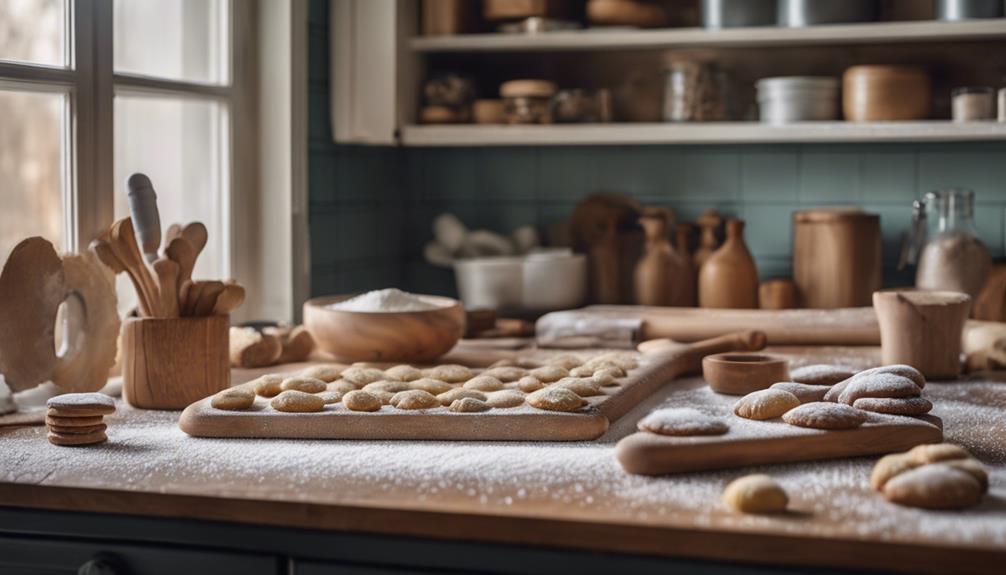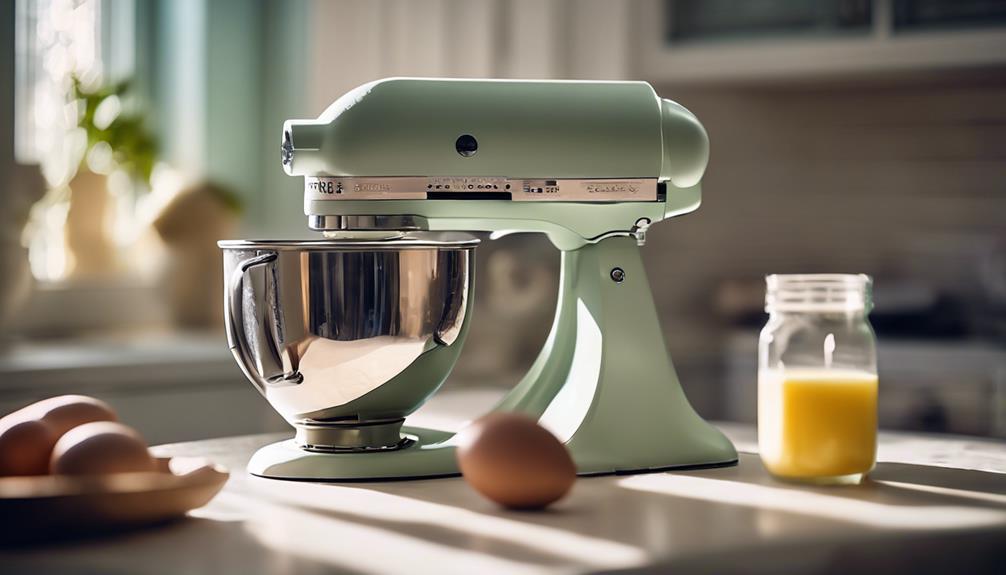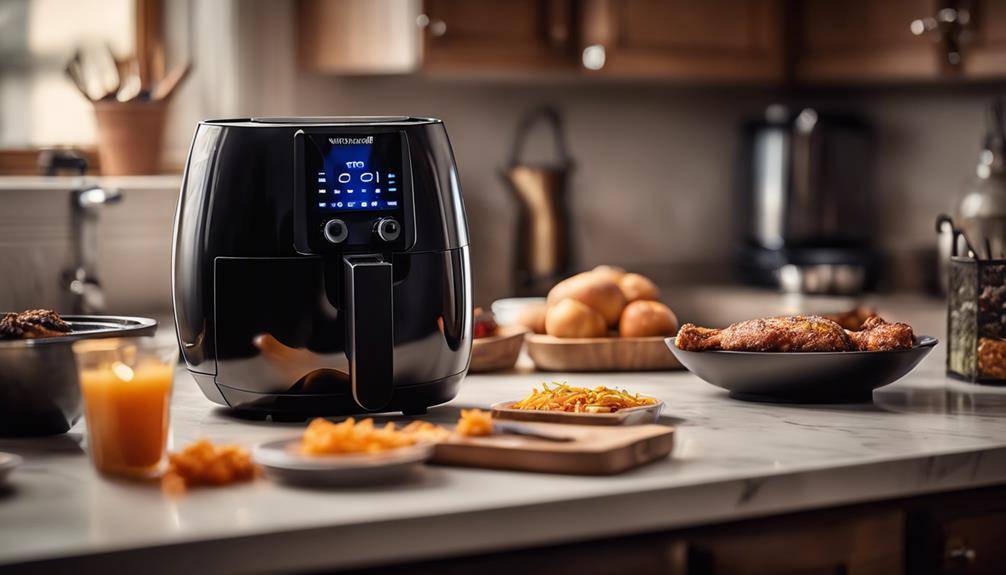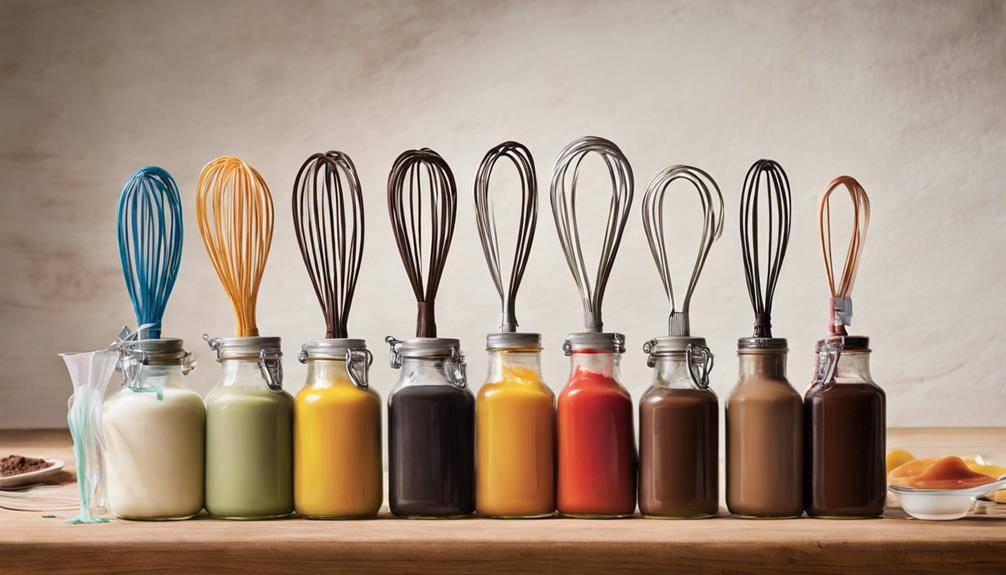Affordable Rolling Pins For Beginners

If you’re starting out in baking, finding an Affordable Rolling Pins For Beginners is a smart move. Look for classic wooden pins or silicone options, which offer durability and ease of use. Brands like OXO and Joseph Joseph provide reliable choices without breaking the bank. These pins help you achieve even dough thickness while being comfortable to handle. Remember, proper care is essential; clean your pin with a damp cloth and avoid soaking it. Storing your pin correctly will also prolong its life. There’s a lot more to explore about different styles and where to buy them, so keep going!
Importance of a Good Rolling Pin
When you’re starting your baking journey, having a good rolling pin can make all the difference. A quality rolling pin helps you achieve the right dough thickness for everything from cookies to pastries. Understanding the rolling pin history reveals that this essential kitchen tool has evolved greatly over centuries, but its core purpose remains the same: to help you create perfectly rolled dough.
There are various rolling pin styles, each designed for specific tasks. For instance, a classic French rolling pin, with its tapered ends, offers excellent maneuverability when shaping dough. Conversely, a thicker, heavier pin, like a marble rolling pin, provides more weight to press down on the dough, making it easier to roll out thicker pastry. Choosing the right style can enhance your baking experience and the quality of your final product.
A good rolling pin isn’t just about aesthetics; it’s about functionality. A well-balanced rolling pin gives you better control, allowing you to apply even pressure across the dough. This uniformity prevents uneven cooking and guarantees your baked goods rise evenly. Additionally, a quality pin can last for years, making it a worthwhile investment for any beginner baker.
Types of Rolling Pins
Rolling pins come in various types, each tailored to different baking needs. Understanding these different styles can make your baking experience more enjoyable and efficient. The most common type is the classic wooden rolling pin. Its sturdy design is perfect for rolling out dough for cookies, pies, and pastries. You’ll appreciate the control it gives you while mastering your rolling pin techniques.
If you’re looking for something a bit lighter, consider a marble rolling pin. This type not only looks beautiful but also stays cool, making it ideal for working with delicate doughs, like puff pastry. The weight of the marble helps you roll out dough smoothly, reducing the effort needed on your part.
Another popular option is the silicone rolling pin. It’s flexible and non-stick, which means you won’t have to worry about dough sticking to the surface. This can be especially helpful for beginners still perfecting their rolling skills. Plus, many silicone pins come in various vibrant colors, adding a fun touch to your kitchen.
Lastly, there are adjustable rolling pins that come with rings on the ends. These allow you to roll dough to a specific thickness, which can be a game-changer for those who want consistent results. By experimenting with these different styles, you’ll find the rolling pin that best suits your baking needs. Embrace these options, and soon you’ll be rolling dough like a pro!
Features to Consider
When choosing a rolling pin, it’s important to think about the material and how durable it is for your needs. You’ll also want to take into account the size for versatility in your baking projects, as well as how easy it is to clean after use. These features can make a big difference in your overall experience.
Material Durability
Choosing the right material for your rolling pin can greatly impact its durability and performance in the kitchen. When considering material types, you’ll find options like wood, marble, and silicone, each offering unique advantages. Wooden rolling pins are traditional favorites, known for their sturdy construction and comfortable grip. They can last for years with proper care, contributing to good rolling pin longevity.
Marble rolling pins are another excellent choice. Their weight helps with rolling out dough effortlessly, and the cool surface is ideal for pastry work. However, they can be prone to chipping if not handled carefully. Silicone rolling pins are lightweight and flexible, making them easy to store and clean. They’re less likely to stick to your dough, but they may not provide the same heft as wood or marble.
Ultimately, think about how often you’ll use your rolling pin and the types of dough you’ll be working with. Investing in a durable material will pay off in the long run, ensuring your rolling pin remains a reliable tool in your kitchen for years to come.
Size Versatility
Finding the right size for your rolling pin can make a significant difference in your baking experience. When it comes to size versatility, consider how it affects your dough thickness. A standard rolling pin, usually around 18 inches long, is great for most tasks like rolling out pie crusts or cookie dough. However, if you often work with smaller batches, a mini pin of about 12 inches might be more manageable.
Size recommendations often suggest having multiple rolling pins on hand. A larger pin is perfect for bigger projects, while a smaller one can help you control dough thickness better in delicate tasks. If you’re into making pasta or intricate pastries, a tapered rolling pin can also give you more control, allowing you to adjust the pressure based on your desired thickness.
Don’t forget to evaluate the diameter of the pin as well. A thicker pin can provide better leverage, making it easier to roll out tougher doughs. Ultimately, choosing the right size rolling pin guarantees you can tackle any recipe with confidence, achieving the perfect dough thickness every time.
Ease of Cleaning
Cleaning your rolling pin shouldn’t feel like a chore. Choosing a rolling pin that’s easy to clean can save you time and effort in the kitchen. Look for materials like silicone or stainless steel, which are typically non-stick and require minimal scrubbing. When you’re done rolling out dough, simply wipe it down with a damp cloth or rinse it under warm water.
If you’ve used wooden pins, remember that they need a bit more care. Use gentle cleaning methods—avoid soaking them in water, as this can warp the wood. Instead, wipe them with a damp cloth and dry them immediately. Occasionally, treat your wooden rolling pin with food-safe mineral oil to maintain its surface and prevent cracking.
For all types of rolling pins, keep these maintenance tips in mind: always store them in a dry place, and avoid exposing them to extreme temperatures. By following these simple cleaning methods and maintenance tips, your rolling pin will stay in great shape, making your baking experience enjoyable and hassle-free. With a little care, you’ll find that cleaning your rolling pin can be quick, easy, and even satisfying!
Top Affordable Rolling Pins
When you’re on the lookout for an affordable rolling pin, it’s essential to narrow down your options based on what suits your baking style. Different materials and designs can considerably impact your rolling experience, so consider what feels right for you.
One of the best brands to start with is OXO. Their rolling pins are known for their ergonomic handles and durable construction, making them a favorite among beginners. User reviews often highlight how comfortable these pins are to use, especially during long baking sessions.
Another great option is the Joseph Joseph Rolling Pin, which features adjustable thickness rings. This design helps you achieve consistent dough thickness, something that many bakers find vital. Users love how easy it is to switch between different dough types with this pin, and many rave about its stylish appearance.
If you’re after something even more budget-friendly, check out the classic wooden rolling pin from Farberware. This brand’s rolling pins are reliable, sturdy, and have been around for years. User reviews often commend its simplicity and effectiveness, making it a perfect choice for those just starting out.
Lastly, the silicone rolling pin from Silpat is an innovative choice that stands out in user reviews for its non-stick surface. This feature makes rolling out dough a breeze, eliminating the need for excess flour. With these options, you can find an affordable rolling pin that perfectly fits your baking needs.
How to Care for Your Rolling Pin
Caring for your rolling pin is essential to keep it in great shape for all your baking adventures. You’ll want to learn the best cleaning techniques, proper storage methods, and how to avoid common damage. With a little attention, your rolling pin can last for years and make your baking experience even more enjoyable.
Cleaning Techniques Explained
To keep your rolling pin in great shape, you’ll want to adopt some simple cleaning techniques after each use. Start by wiping it down with a damp cloth to remove any flour or dough residue. Avoid soaking your rolling pin in water, as this can warp the material, especially if it’s made of wood. Instead, make sure to use a gentle soap if needed, but rinse it quickly.
For wooden rolling pins, consider applying a food-safe mineral oil occasionally. This not only helps with rolling pin maintenance but also keeps the wood from drying out and cracking. If you use your rolling pin for sticky doughs, sprinkle a little flour on it before rolling. This can minimize cleanup and maintain the surface quality.
For silicone or marble rolling pins, a simple wipe with a damp cloth usually suffices. After cleaning, let your rolling pin dry completely before storing it away. Remember, consistent care will extend the life of your rolling pin, ensuring it remains a reliable tool in your kitchen. Adopting these cleaning techniques will make your baking experience smoother and more enjoyable!
Proper Storage Methods
Storing your rolling pin properly is essential for maintaining its condition and functionality. To guarantee longevity, consider a few effective storage solutions. First, find a designated spot in your kitchen—preferably a drawer or cabinet—where it can rest without being jostled by other utensils. This prevents any accidental damage while keeping it easily accessible.
If you’re short on space, consider hanging your rolling pin using a wall-mounted rack. This not only saves space but also adds a decorative element to your kitchen decor. Another great option is to use a sturdy container or basket on your countertop, allowing for easy organization while keeping it within reach during baking sessions.
For added protection, wrap your rolling pin in a clean dish towel or a dedicated fabric cover. This method keeps it safe from dust and scratches. Remember, regular checks on your storage area for any moisture or spills can help you avoid potential damage. With these organization tips in mind, you can confidently store your rolling pin, guaranteeing it’s always ready for your next baking adventure.
Avoiding Common Damage
Proper storage methods help keep your rolling pin in great shape, but regular care is just as important to avoid common damage. To start, always clean your rolling pin with a damp cloth after each use. Avoid soaking it in water, as this can warp the wood and ruin its shape. When it comes to preventing scratches, be mindful of the surfaces you roll on. Always use a clean, soft surface, like a silicone mat or a wood board, to protect both your rolling pin and your countertop.
Maintaining finish is essential for longevity. If you notice your rolling pin starting to lose its luster, apply a food-safe mineral oil or beeswax to help restore its shine. This not only enhances the appearance but also creates a barrier against moisture and food particles.
Tips for Beginner Bakers
Baking can be a delightful adventure, especially for beginners enthusiastic to create delicious treats in their own kitchens. To get started, familiarize yourself with basic baking techniques. Simple methods like creaming butter and sugar or folding ingredients can make a big difference in your results. Don’t hesitate to watch tutorial videos or read recipes carefully—this’ll help you grasp the essentials.
Next, pay attention to flour types. Different recipes often call for specific flours, and using the right one can enhance your baking. All-purpose flour is a versatile choice for cookies and cakes, while bread flour has a higher protein content, perfect for yeasted breads. If you’re feeling adventurous, try cake flour for a lighter texture, or whole wheat flour for a nuttier flavor.
When you first start baking, measure your ingredients precisely. A kitchen scale can be a game-changer, ensuring accuracy and consistency. Remember, baking is a science, so even small discrepancies can affect your outcomes.
Lastly, don’t be afraid to experiment! Baking is all about practice, and mistakes are part of the learning process. If a recipe doesn’t turn out as expected, analyze what went wrong and try again. With patience and a bit of creativity, you’ll improve your skills over time. So roll up your sleeves, grab your rolling pin, and enjoy the journey of baking!
Where to Buy Rolling Pins
When you’re ready to invest in a rolling pin, you have plenty of options at your fingertips. Start by checking online retailers. Sites like Amazon, Walmart, and specialty kitchenware brands offer a wide selection, allowing you to read rolling pin reviews and compare prices easily. You’ll likely find various materials, sizes, and styles that suit your baking needs.
If you prefer to see the product in person, local stores like Target or your nearest kitchen supply shop can be great choices. These places often carry affordable options, and you can sometimes find rolling pins on display, which helps you feel their weight and texture before making a purchase. Don’t forget to look for seasonal sales, as many retailers offer discounts during holidays or events.
Specialty shops, especially those focusing on baking supplies, can provide unique choices that might not be available in larger retail chains. These shops often stock quality rolling pins that cater to specific baking styles, from French pins to traditional models.
Before you make a decision, take a moment to do some price comparisons. Many websites and apps can help you find the best deal. Additionally, keep an eye out for discount options or coupons that can save you some money. With a bit of research, you can find an affordable rolling pin that meets your needs and enhances your baking experience. Happy rolling!
Frequently Asked Questions: Affordable Rolling Pins For Beginners
Can I Use a Rolling Pin for Non-Baking Tasks?
You can use a rolling pin for various non-baking tasks, like crushing crackers or making dough for pasta. It’s a versatile tool, perfect for kitchen hacks that simplify meal prep and save time.
How Do I Choose the Right Size Rolling Pin?
To choose the right size rolling pin, consider rolling pin dimensions that suit your needs. Opt for different rolling pin styles, like tapered or straight, depending on your comfort and the dough types you’ll work with.
Are There Rolling Pins Suitable for Gluten-Free Dough?
Yes, there are rolling pins perfect for gluten-free dough. You’ll find that using specific gluten-free techniques and proper dough handling can make a difference. Choose one with a smooth surface for best results.
Can Rolling Pins Be Personalized or Customized?
Absolutely, you can personalize rolling pins! Many options exist with engraved designs or custom colors, allowing you to create a unique piece that reflects your style. It’s a fun way to enhance your baking experience!
What Is the Best Material for a Rolling Pin?
When choosing the best material for a rolling pin, consider material comparisons like wood, marble, and silicone. Each offers unique rolling pin features that affect ease of use, weight, and heat retention during baking.
Conclusion
To sum up, investing in a good rolling pin makes a big difference in your baking journey. By exploring the types, features, and top affordable options, you can find the perfect tool to start creating delicious treats. Remember to care for your rolling pin properly, and don’t hesitate to experiment with your baking skills. With the right rolling pin and a little practice, you’ll be rolling out dough like a pro in no time! Happy baking!








